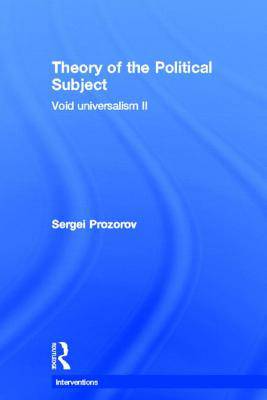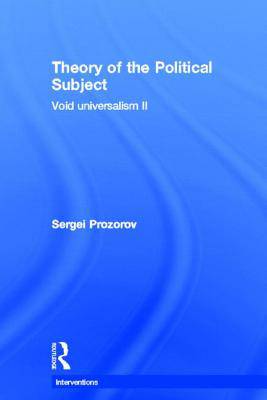
- Retrait gratuit dans votre magasin Club
- 7.000.000 titres dans notre catalogue
- Payer en toute sécurité
- Toujours un magasin près de chez vous
- Retrait gratuit dans votre magasin Club
- 7.000.0000 titres dans notre catalogue
- Payer en toute sécurité
- Toujours un magasin près de chez vous
Description
Together these two companion volumes develop an innovative theory of world politics, grounded in the reinterpretation of the concepts of 'world' and 'politics' from an ontological perspective.
Theory of the Political Subject continues the project of reconstruction of political universalism begun in Ontology of World Politics. Having redefined world politics in terms of the affirmation of the universal ontological axioms of freedom, equality and community in an infinite multiplicity of particular situations or 'worlds', in this book Prozorov focuses on the way this affirmation is actually practiced, analysing the conditions for the emergence within a world of the subject of its radical transformation. Drawing on the contemporary reassessment of the notion of the subject in continental political thought, particularly the work of Alain Badiou, Prozorov defines the political subject in terms of one's subtraction from the positive order of one's world, the weakening of one's particular identity that makes possible one's participation in the affirmation of the universal. The book proceeds with outlining the path of the political subject within its world, from the point of its inception to its confrontation with ethical, epistemic and other limits to its activity. This account of the subjective aspect of world politics also offers new and stimulating perspectives on such key issues of political theory as the relation of politics to human nature, the role of violence in politics and the conditioning of politics by philosophical or scientific knowledge.
Systematic and accessible, these works will be key reading for all students and scholars of political science and international relations.
Spécifications
Parties prenantes
- Auteur(s) :
- Editeur:
Contenu
- Nombre de pages :
- 168
- Langue:
- Anglais
- Collection :
Caractéristiques
- EAN:
- 9780415842440
- Date de parution :
- 23-09-13
- Format:
- Livre relié
- Format numérique:
- Genaaid
- Dimensions :
- 156 mm x 233 mm
- Poids :
- 384 g

Les avis
Nous publions uniquement les avis qui respectent les conditions requises. Consultez nos conditions pour les avis.






